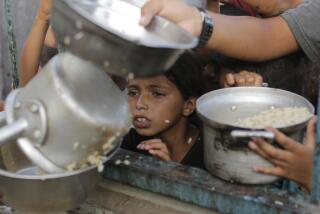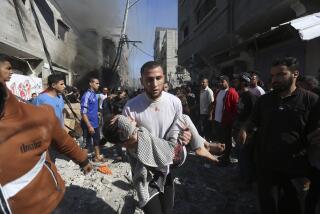Two Highways to Baghdad Closed Down
- Share via
BAGHDAD — Attacks on convoys transporting goods and troops forced the U.S.-led coalition in Iraq to shut down sections of two major highways Saturday, further isolating this edgy capital and raising the risk of supply shortages.
The indefinite closures of Highways 1 and 8 north and south of Baghdad came after days of roadside bombings and ambushes that have disrupted shipments of fuel and other products to and from the city. In addition, the western highway leading to Syria and Jordan has been shut because of insurgent attacks and U.S. military operations around Fallouja, which lies along the route.
Meanwhile, U.S. and Iraqi authorities reported progress in negotiations aimed at ending Marines’ nearly two-week siege of Fallouja. Marines agreed to allow residents to carry weapons, relax a curfew and increase access for ambulances, among other steps. But U.S. officials have been warning that they cannot wait much longer to assume full control of the city of 300,000 about 35 miles west of Baghdad.
Farther west, in Qaim near the Syrian border, Marines and insurgents reportedly fought for hours. Five Marines, plus scores of insurgents, were killed, a journalist from the St. Louis Post-Dispatch traveling with the troops said.
The military did not immediately confirm those deaths, but did report that one U.S. soldier died Saturday when a homemade bomb struck a convoy in Baghdad and another was killed Friday when a patrol struck an antitank mine near Tikrit.
Saturday’s highway shutdowns came as the sight of tankers and other vehicles ablaze along the roads had become commonplace. Kalashnikov-toting insurgents have seized hostages -- including truckers -- at makeshift checkpoints and ambush points, and some terrified drivers have refused to work.
The havoc on the highways has exacerbated a climate of uncertainty and fear in the capital, where rumors abound of militants striking Baghdad.
Brig. Gen. Mark Kimmitt, chief coalition military spokesman, said Saturday’s road closures had nothing to do with cutting off any prospective insurgent offensive.
“If fighters would like to take the fight to Baghdad, they’ll have the 1st Cavalry Division waiting for them,” he said, referring to the Army unit based in the capital.
Instead, Kimmitt said, the indefinite closures are meant to give Iraqi engineers and coalition forces time to repair the routes, which have been chewed up by homemade bombs. It was unclear, however, how the military intended to provide security for any construction crews.
The continuing attacks on convoys could slow civilian supplies and the $18-billion U.S. reconstruction effort, Kimmitt acknowledged last week. But serious shortages have not yet surfaced, he said.
As for the military -- which now has convoy lines crisscrossing the country with supplies and fresh troops -- officials insist that the attacks will not have a crippling effect. Commanders have the capability to fly in needed goods, Kimmitt said.
As U.S. officials closed off the highways, rockets and mortar rounds fell at various points around Baghdad on Saturday. Civilians interviewed at four sites that suffered damage expressed a sense of dread that matters might soon deteriorate further, particularly if uprisings among Sunni Muslim insurgents in Fallouja and Shiite Muslim militants in southern Iraq result in more clashes with U.S. troops.
“Things are so bad in Iraq now that one can get killed just sitting in the house with one’s children and family,” said cigarette factory executive Emad Luis, 48, whose house in the Karada neighborhood was damaged in a blast. “Everything seems to be getting worse and worse.”
A mile away, neighbors mourned Abdel Adim Sandi, an immigrant from Sudan who was killed by one of Saturday’s shells.
“He was a hard worker, an honest man,” said his disconsolate longtime friend Kamal Abed Jassim, who was standing about a yard from Sandi when the shell struck, but avoided serious injury.
A spate of hostage-taking -- mostly along the roads -- has added to the sense of a deepening crisis. On Saturday, though, two Japanese hostages were released; all five Japanese seized in Iraq have now been freed.
There was no official word on Pfc. Keith Matthew Maupin, 20, who was shown being held hostage on a video that aired Friday on Al Jazeera. He is believed to have been taken captive when insurgents attacked a convoy about 10 days ago.
Dan Senor, chief spokesman for the U.S.-led coalition here, declined to comment Saturday when asked whether Maupin was considered a hostage or prisoner of war. A captor in the videotape said Maupin would be held to be exchanged for Iraqi prisoners detained by U.S. forces. But officials are adamant that no such talks will take place.
In the south, U.S. troops skirmished for a second day near Najaf with militiamen loyal to Shiite cleric Muqtada Sadr. No breakthroughs were reported in talks aimed at resolving the impasse between the two sides. The U.S. military said that a coalition soldier with the Spanish-led force in Najaf was killed Friday in fighting with Sadr’s militia.
In Fallouja, U.S. officials say a fragile cease-fire has been generally holding, despite violations by insurgents. After a seven-hour meeting Saturday among Marines, occupation officials and Fallouja civic leaders, U.S. forces made several concessions.
Perhaps most significantly, Marines will now let residents carry guns -- including AK-47s -- on the streets and must see “absolute” hostile intent before opening fire. Previously, carrying a weapon was considered hostile intent, but Fallouja leaders said citizens needed to bear arms to protect themselves and their property because law and order had broken down.
Late Saturday, Marines and insurgents engaged in taunts via loudspeakers. The two forces are just a few blocks apart in the city, where the Marines occupy about 40% of the area.
Marines broadcast a notice that anyone out beyond 9 p.m. would be considered in violation of curfew, relaxing the previous 7 p.m. curfew. The insurgents responded that they were coming to kill the Marines. The Marines dismissed any such attack, calling their listeners “cowards.”
*
McDonnell reported from Baghdad and Perry from Fallouja.
More to Read
Sign up for Essential California
The most important California stories and recommendations in your inbox every morning.
You may occasionally receive promotional content from the Los Angeles Times.













